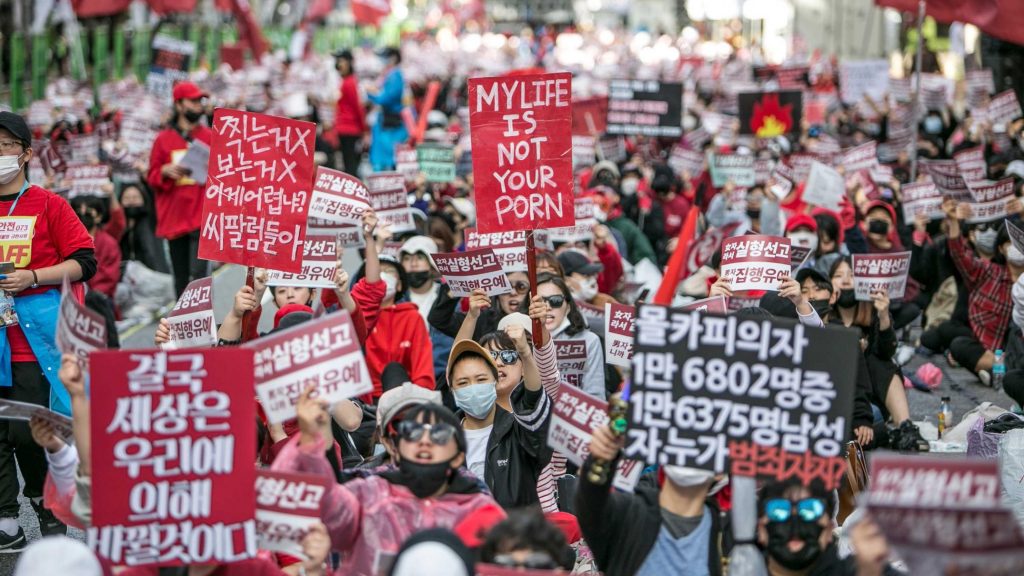Formation of the first feminist political party in independent South Korea comes as a potential answer to ending pervasive spy cam porn epidemic and strict beauty standards. Yet, a long path separates it from mainstream success.
Despite its economic and technological advances and global popularity of its pop music, South Korea is a country that remains traditional and essentially patriarchal society. It ranked 108th out of 153 on the World Economic Forum’s 2020 Global Gender Gap Index. Even though it is ranked among the lowest in the developed world for gender equality, a feminist party was fighting for parliamentary seats during the May 2020 elections for the first time in history.
South Korea was the first country to hold national elections during the COVID-19 pandemic drawing global attention. But the virus not only didn’t discourage people from participation as it had a high voter turnout, but also a record number of women were elected to the parliament- 57 women lawmakers were elected to the 300-seat National Assembly. Women comprise only 17% of MPS in the parliament, which is well below the global average of about 25%, and feminist issues are often framed as “not representing the mainstream” and “too extreme”.
Engaging women in politics
Formation of the Women’s Party (Yeoseong-uidang), the first feminist political party in independent South Korea, comes as a potential answer to ending pervasive spy cam porn epidemic and strict beauty standards. The party was established on 8 March 2020 on International Women’s Day. It put forward four candidates in the proportional representation section of the vote and it needed 3% of the popular vote in order to secure a single seat in the National Assembly. They didn’t win any seat but claimed more than 200 000 votes out of 29 million.
The party was unlikely to attract male voters, so it needed the support of 6% of all women. Such a number is quite ambitious in South Korea, where two major parties and their satellite entities rule the political system. The election was won by the ruling left-leaning Democratic Party of Korea and the conservative United Future Party remains in the opposition. Single-issue parties have been struggling to get voted into the parliament which has been dominated by the two parties.
There were various reasons for why it was difficult for the Women’s Party to attract wider voters’ support. It was not only the lack of support from male voters, or from supporters of larger parties. One of the issues of the feminist party was the lack of a more sophisticated program and the fact that they could not rely on female voters just because they were dealing with gender issues. Women in South Korea have more profound problems, such as children’s education, sky-high property prices, the wage gap, and others. For many, it might have been discouraging to cast their vote in order to secure a single seat in the parliament as it might not make a significant difference.
Even though there have been several rallies organized together with petitions against sexual violence, only minor legal and societal changes have been made. As a response, the feminist movement chose to try and have their voices heard in the National Assembly. One of the four candidates was Kim Ju-hee, who was among the youngest candidates in the whole election. The Women’s Party has about 10 000 members and about ¾ of them are in their 20s.
Being an open feminist in South Korea can lead to social stigma and only a few women dare to take the challenge as they are often framed as irrational and selfish. As the party candidate Lee Ji-won said, the party members receive online death threats which are discouraging and make it even more complicated for women to stand for their rights.
But establishing the party was only the first step in how to put women’s issues on the political agenda. After the disappointing result of the election, the party decided to launch a school for training female candidates, preparing them for local, municipal and provincial elections due in 2022. The school, which is planned to open by July, will be based in Seoul and will welcome open women politicians from remote regions, as they might have less resources and experience.
Literature brings women’s issues to the forefront
Two particular books by South Korean authors that have gained a global attraction and managed to raise awareness of these issues abroad are “The Vegetarian” by Han Kang and “Kim Ji-yong, born 1982” by Cho Nam-joo. Both protagonists are women suffering under the Korean patriarchal culture.
Their stories are anonymous so women can easily identify with them. Suffering from mental health problems as a result of upbringing, neither of them can find support in their husband or family. These two books are tiny chronicles of all the small ways women experience belittling in South Korea.
The Vegetarian presents a more extreme allegory for the struggle to fight against social patriarchal norms winning the 2016 Man Booker International Prize. Yet both have found readers and supporters in South Korea and abroad, especially after #metoo movement. Women of Kim Ji-young’s generation are those who suffer in times when physical abuse and discrimination are illegal, however, violent culture remains.
While it is hard for women’s issues to gain attention in a society that had for long ignored the status of women, their collective wish to bring about changes and live a dignified life might slowly come into fruition. The establishment of the feminist political party is the first of many steps needed, yet the party has a long way ahead of them before the 2024 election.






